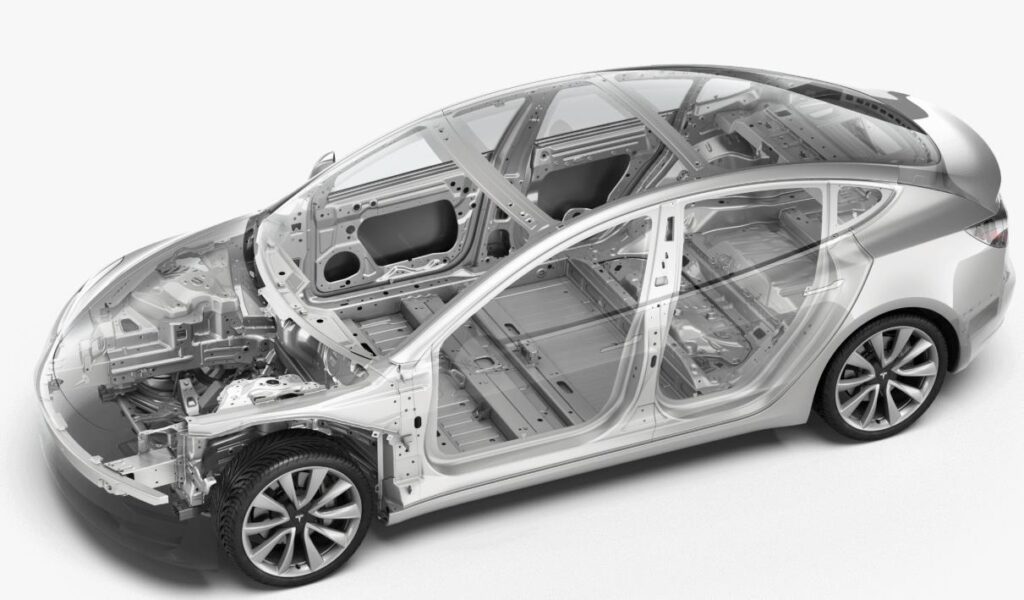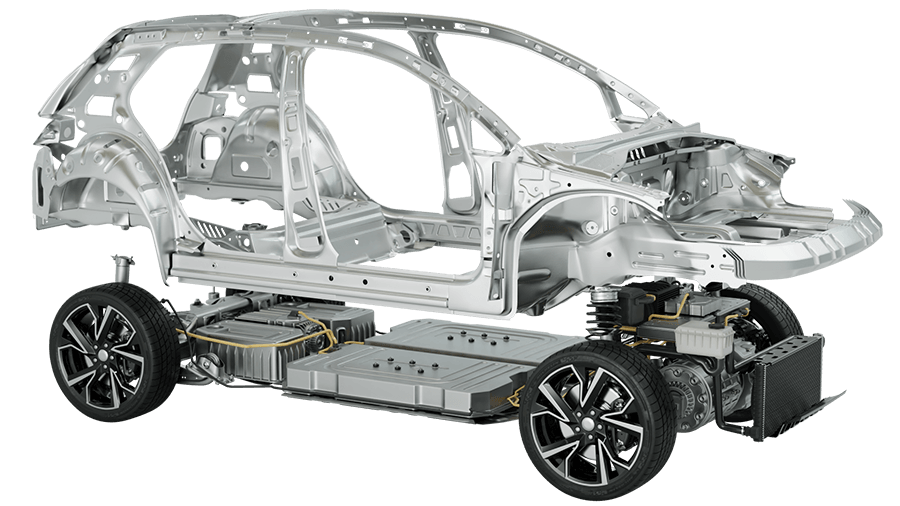BIW for Electric Vehicle - Differentiator & Skills Required
Body-in-White (BIW) refers to the initial stage of the automobile body assembly process where individual sheet metal components are welded together to form the car’s structure.
In the case of electric vehicles (EVs), the BIW process presents several unique challenges and opportunities.
One major difference is the weight of the vehicle, as EVs typically have a heavier battery pack and fewer internal combustion components, which affects the design and construction of the BIW. This requires a different approach to structural design, welding, and corrosion protection.
Another factor is the lack of a traditional engine, which frees up space in the vehicle that can be used for other components or for more passenger room. Additionally, the high-voltage battery pack and electric drivetrain require specialized safety measures in the BIW to protect against electrical hazards.
EVs also offer the opportunity to use lightweight materials such as aluminum or composites, which can improve the vehicle’s energy efficiency and reduce weight.
In conclusion, the BIW process for EVs requires a new approach to design and construction to accommodate the unique requirements of electric vehicles, but it also presents the opportunity to use new materials and techniques to improve the efficiency and performance of these vehicles.
ICE Vehicle BIW v/s Electric Vehicle BIW
The Body-in-White (BIW) of an internal combustion engine (ICE) vehicle and an electric vehicle (EV) have some important differences that reflect the different requirements and design constraints of these two types of vehicles. Some of these differences are:
1. Material selection: The BIW of an EV is often made of lightweight materials such as aluminum and high-strength steels to reduce the overall weight of the vehicle and increase energy efficiency. In contrast, the BIW of an ICE vehicle is often made of more conventional materials such as low strength steel and iron.
2. Component design: The design of BIW components for EVs is often influenced by the need to accommodate the electric drivetrain, batteries, and other components, which can result in more complex shapes and tight packaging requirements. The design of BIW components for ICE vehicles is less constrained by these requirements and can be simpler.
3. Manufacturing processes: The manufacturing processes used to produce the BIW components for EVs may differ from those used for ICE vehicles due to the different materials and design requirements. For example, the use of lightweight materials in EVs may require the use of different forming and joining methods, such as laser welding and friction stir welding.
4. Crash safety: The design of the BIW for EVs must take into account the need to provide adequate crash protection for the electric drivetrain and batteries, which can add complexity to the design and require additional materials and reinforcement.
5. Corrosion protection: The design of the BIW for EVs must take into account the potential for corrosion due to the presence of high-voltage electrical components and the use of lightweight materials, which may require the use of specialized coatings and treatments.
In conclusion, the differentiation between the BIW of an ICE vehicle and an EV reflects the different requirements and design constraints of these two types of vehicles, and requires careful consideration of materials, component design, manufacturing processes, crash safety, and corrosion protection.

Skills for a BIW Development for Electric Vehicle
Developing a Body-in-White (BIW) for an electric vehicle (EV) requires a combination of technical skills and knowledge in several areas, including:
1. Structural design: A thorough understanding of vehicle dynamics, crash safety, and materials science is required to design a BIW that meets regulatory requirements and provides a safe and robust structure for the vehicle.
2. Manufacturing engineering: Experience with advanced manufacturing techniques such as laser welding, resistance spot welding, and hot stamping is essential for producing high-quality BIW components with consistent tolerances.
3. Materials science: Knowledge of lightweight materials such as aluminum, magnesium, composites, and high-strength steels is required to choose the best materials for the BIW, given the specific requirements of the EV.
4. Electrical safety: Knowledge of high-voltage electrical systems and safety standards is necessary to design a BIW that protects against electrical hazards and meets regulatory requirements.
5. Tool and die design: Experience with tool and die design is necessary to produce complex BIW components with tight tolerances and consistent quality.
6. Computer-aided design (CAD) and simulation: Proficiency in using CAD and simulation software is critical for designing, analyzing, and optimizing the BIW components and the overall vehicle structure.
In conclusion, developing a BIW for an EV requires a cross-functional team with expertise in several technical areas, including structural design, manufacturing engineering, materials science, electrical safety, tool and die design, and computer-aided design and simulation.


Key Points in the Development of a BIW for Electric Vehicle
The development of press dies for the Body-in-White (BIW) of an electric vehicle (EV) requires a careful consideration of several key points, including:
1. Tolerance and quality: Press dies must be designed to produce components with tight tolerances and consistent quality, as deviations from the desired shape can impact the overall performance and safety of the vehicle.
2. Lightweight materials: The use of lightweight materials such as aluminum and high-strength steels in the BIW of EVs requires the press dies to be designed to form these materials without causing damage or impairing their strength properties.
3. Complex shapes: The design of press dies for EVs must take into account the need to form complex shapes that meet the specific requirements of the BIW, including crash safety, aerodynamics, and packaging.
4. Durability and wear resistance: Press dies are subjected to high levels of stress and strain during the stamping process, so they must be designed and made of materials that provide good durability and wear resistance to ensure long-lasting performance.
5. Simulation and testing: Computer-aided design (CAD) and simulation software can be used to design and optimize the press dies, while physical testing can validate their performance and ensure they meet the required standards.
6. Cost-effectiveness: The press dies must be designed and produced in a cost-effective manner to minimize the overall cost of the BIW production process and maximize the competitiveness of the EV.
In conclusion, the development of press dies for the BIW of EVs requires a careful balance of technical considerations, such as tolerance and quality, materials, and shape, and practical considerations, such as durability, cost, and efficiency, to ensure that the press dies meet the performance and cost requirements of the EV industry.
How NULO can Support?
NULO can support the entire Body-in-White (BIW) development for an electric vehicle (EV) by providing a range of specialized services and expertise, including:
Design and engineering services: NULO can offer design and engineering services to help develop the BIW components and overall vehicle structure, taking into account the specific requirements of the EV, such as crash safety, aerodynamics, and packaging.
Prototype and testing services: NULO can provide prototype development and testing services to validate the design and performance of the BIW components and overall vehicle structure, including crash testing, fatigue testing, and corrosion testing.
Manufacturing support: NULO can provide support for the manufacturing of the BIW components, including the selection of materials and processes, the design of tooling and fixtures, and the optimization of the production line.
Quality control and certification: NULO can provide quality control and certification services to ensure that the BIW components and overall vehicle structure meet the required standards for safety, performance, and reliability.
Regulatory compliance: NULO can provide support to ensure that the BIW meets the regulatory requirements and safety standards for EVs, including crash safety, electrical safety, and environmental regulations.
NULO can play a critical role in supporting the entire BIW development process for EVs, providing a range of specialized services and expertise in design and engineering, prototyping and testing, manufacturing, quality control, and regulatory compliance.




I am glad to be a visitant of this utter web blog! , thankyou for this rare info ! .
Bwer Company is a top supplier of weighbridge truck scales in Iraq, providing a complete range of solutions for accurate vehicle load measurement. Their services cover every aspect of truck scales, from truck scale installation and maintenance to calibration and repair. Bwer Company offers commercial truck scales, industrial truck scales, and axle weighbridge systems, tailored to meet the demands of heavy-duty applications. Bwer Company’s electronic truck scales and digital truck scales incorporate advanced technology, ensuring precise and reliable measurements. Their heavy-duty truck scales are engineered for rugged environments, making them suitable for industries such as logistics, agriculture, and construction. Whether you’re looking for truck scales for sale, rental, or lease, Bwer Company provides flexible options to match your needs, including truck scale parts, accessories, and software for enhanced performance. As trusted truck scale manufacturers, Bwer Company offers certified truck scale calibration services, ensuring compliance with industry standards. Their services include truck scale inspection, certification, and repair services, supporting the long-term reliability of your truck scale systems. With a team of experts, Bwer Company ensures seamless truck scale installation and maintenance, keeping your operations running smoothly. For more information on truck scale prices, installation costs, or to learn about their range of weighbridge truck scales and other products, visit Bwer Company’s website at bwerpipes.com.
What i don’t realize is in truth how you are now not really a lot more neatly-favored than you may be now. You are so intelligent. You understand therefore considerably in relation to this matter, produced me for my part believe it from numerous numerous angles. Its like men and women aren’t fascinated except it¦s something to do with Lady gaga! Your own stuffs outstanding. All the time deal with it up!
Choose BWER for trusted weighbridge systems in Iraq, offering customized solutions to optimize your industrial operations and ensure precise weight measurement every time.
BWER is Iraq’s premier provider of industrial weighbridges, offering robust solutions to enhance efficiency, reduce downtime, and meet the evolving demands of modern industries.
Well I sincerely liked reading it. This subject offered by you is very helpful for correct planning.
obviously like your web-site but you need to take a look at the spelling on several of your posts. Many of them are rife with spelling problems and I in finding it very bothersome to tell the reality then again I will surely come back again.
Hiya, I am really glad I’ve found this info. Today bloggers publish only about gossips and web and this is really annoying. A good website with interesting content, this is what I need. Thanks for keeping this site, I’ll be visiting it. Do you do newsletters? Can not find it.
Very well written story. It will be supportive to everyone who usess it, including myself. Keep up the good work – for sure i will check out more posts.